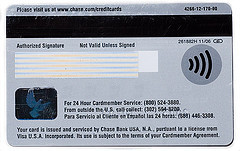Chase To Pay $389 Million Over Illegal Charges For Credit-Monitoring Services

(codestr)
The good news for Chase is that it’s already given back a lot of that money to affected customers.
Regardless, that didn’t stop the Consumer Financial Protection Bureau from confirming that the bank did indeed engage in unfair billing practices for things like credit-monitoring services.
In order to sign up for a credit-monitoring service, a consumer generally needs to give his/her permission in writing. But according to the CFPB, between 2005 and 2012, Chase just went ahead and enrolled 2.1 million consumers in credit card “add-on” products — like identity-theft protection and fraud monitoring services — that promised to monitor customer credit and alert consumers to potentially fraudulent activity — without getting the requisite permissions.
Furthermore, Chase began charging credit card customers immediately upon enrollment, even if they were not actually receiving the services yet. Monthly fees ranged from $7.99 to $11.99, even though Chase was not always performing the paid-for services.
In some cases, these charges caused cardholders to go over their credit limits, leading to additional fees on top of the ones they shouldn’t have been charged in the first place. And then there’s the interest accruing on these fees for cardholders who didn’t pay their balance in full each month.
Chase began proactively issuing refunds to affected customers in late 2012. Those who still have credit card accounts with the bank should have received a credit on their statements, while those who are no longer with Chase should have received payment by mail. Those who were illegally charged for these services but did not receive a refund should contact Chase.
The amount of the refund should have been for the total of any illegally charged fees, interest, and any over-the-limit fees resulting from the charge for the product.
This adds up to $309 million in refunds for the bank. Additionally, it was hit with $80 million in penalties — $20 million going to the CFPB and $60 million to the Office of the Comptroller of the Currency, which initiated the investigation.
Want more consumer news? Visit our parent organization, Consumer Reports, for the latest on scams, recalls, and other consumer issues.

